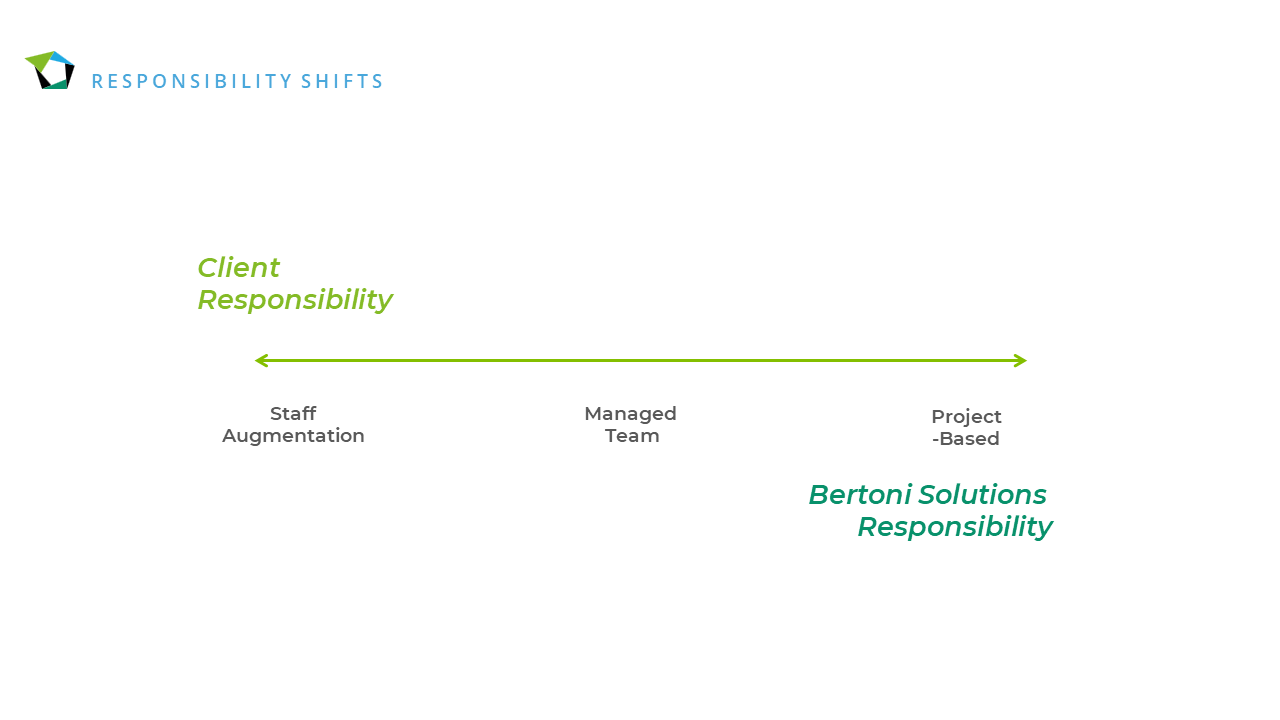Staff augmentation vs. outsourcing: Which model suits your business growth?

José Miguel Arráiz
Human Resources Manager
IT businesses' requirements often rise beyond what their own staff can handle as they develop. To keep up with this expansion, companies need to choose the best way to support their IT teams. Here, a great dilemma surfaces: what’s the best way to go about it? To answer this, we will discuss everything related to staff augmentation vs. outsourcing.
Staff Augmentation Vs Outsourcing: What Are They?
According to a BusinessWire analysis, the worldwide market for IT outsourcing is projected to grow to around USD 397.6 billion by 2025. Only with a bright and highly trained software development professionals pool is it possible to attain such a tremendous growth rate.
Given the rapid advancement of modern technologies, software outsourcing has emerged as a critical business strategy for expanding a team’s skills and achieving desired outcomes. While staff augmentation employs qualified individuals on a temporary basis, IT project outsourcing involves assigning work to outside specialists.
IT Staff Augmentation
IT staff augmentation enables businesses to directly manage an augmented team and employ remote talent from across the world. This approach is commonly employed to expand project teams, temporarily add specialized skill sets, or expedite project completion dates. As such, it is best suited for projects with specific skill requirements or short-term demands.
The most common scenario of IT augmentation is when IT skills are needed for a project that is not available to the existing team. A staff augmentation project would be enlisting React.js developers to enhance the server-side operations code or involving .NET software engineers for developing full-stack web applications.
Another common situation includes cases where a project has a narrow timeframe, and extra help is required to meet the deadline. For example, adding more QA testers to speed up testing during a software release.
When important team members are not available, their absence may cause important project goals to be postponed. In this case, a temporary project manager may be brought in to supervise current projects during the extended absence of the permanent manager.

IT Outsourcing
When using IT outsourcing services, external workers are brought in to handle certain IT tasks or full projects. This tactic is frequently used to cut expenses, boost productivity, or get access to technology and expertise that cannot be found internally.
IT outsourcing is best suited for extended projects or when internal knowledge is limited. One such case is when the company requires reallocating internal resources for other strategic initiatives. For example, delegating IT helpdesk support to enable the internal team to concentrate on creative product development.
If IT is not a primary business function, it can also be better managed by an outside provider. For instance, a team might need the expertise of a remote DevOps service specialist who can help them part-time without a full-time commitment.
Choosing Between Staff Augmentation vs Outsourcing

When deciding between staff augmentation vs. IT outsourcing, you have to carefully assess your project's requirements, budget, and preferred level of management. Here is a checklist to help you out:
Flexibility
Staff augmentation provides great flexibility for businesses to adjust their workforce in response to project needs, either increasing or decreasing as necessary.
You have the option to hire experts for a set period of time without making any long-term promises, which helps you adjust to evolving project requirements more smoothly. A Gartner survey states that 65% of companies view more flexibility as a key benefit of staff augmentation projects.
Outsourcing typically includes set agreements, which may restrict adaptability. In outsourcing, changing the project scope or requirements frequently necessitates renegotiating the contract, which can be both time-consuming and inflexible.
Cost
Staff augmentation usually results in increased initial expenses because of the requirement for specific temporary skill sets. However, it avoids making long-term salary and benefits commitments linked with permanent employees.
Augmenting your staff can be more cost-effective for short-term projects or seasonal demand spikes. Businesses implementing staff augmentation can lower their operating expenses compared to bringing on permanent staff members.
Cost concerns remain the driving force for outsourcing, with an average of 57% of CEOs looking to reduce costs through outsourcing. By contrast, when it comes to building data and analytics skills, 96% of executives rely on service providers.
However, it is crucial to consider potential hidden costs, such as those related to communication barriers, quality control, and contract management.
Control
Staff Augmentation allows for complete supervision of the additional staff, as these temporary team members operate under your guidance and adhere to your company's procedures and values.
This guarantees that project goals are met and high-quality standards are upheld. IT organizations have favoured staff augmentation due to the control it provides for project execution and resource management.
Outsourcing often leads to restricted project control, as the external provider takes charge of the work. Although it can allow internal resources to concentrate on primary tasks, it can also pose difficulties in upholding quality and meeting project needs.
Nearly half of companies have faced challenges with quality control and sticking to requirements while outsourcing, leading to negative effects on project outcomes.
Who's Making Waves in Staff Augmentation Projects?

From small agile startups to giant companies like Google, Apple, Amazon, Microsoft, and IBM, many companies are using staff augmentation to propel their innovation engines.
Google is a multinational technology company specializing in Internet-related services and products. Google uses staff augmentation to develop revolutionary products like the Google Cloud Platform and expand globally into countries such as China and India, establishing the benchmark for innovation.
Apple Inc. is an American multinational technology company that designs, manufactures, and markets consumer electronics, computer software, and online services. Apple strategically uses staff augmentation for its signature products, such as the iPhone and iPad, as well as advanced software like iOS and Mac OS X.
Outsourcing allowed Slack to expand its operations effectively without the need for large investments in infrastructure or hiring expenses upfront. Therefore, they were able to distribute resources wisely, invest in creativity, and maintain a competitive edge.
If you’re looking to join these major players, consider Bertoni Solutions. This reliable partner has the resources to improve your workforce capabilities and outsourcing to optimize operations. With a track record of successfully providing customized staffing solutions, Bertoni Solutions guarantees that you can grow and concentrate on their main goals.
Wrapping Up
Businesses now have significant tools at their disposal to optimize efficiency, promote innovation, and achieve sustainable growth—whether they choose the strategic advantages of outsourcing or the flexibility of staff augmentation.

Choosing between staff augmentation vs. outsourcing relies on the demands of the particular project, long-term objectives, and the necessity for operational management. If you’re a business owner, you can successfully navigate these options and maximize their potential by exploring Bertoni’s Solution. Book a consultation now and see for yourself!


.webp?width=300&height=200&name=make-an-appointment%20(1).webp)




